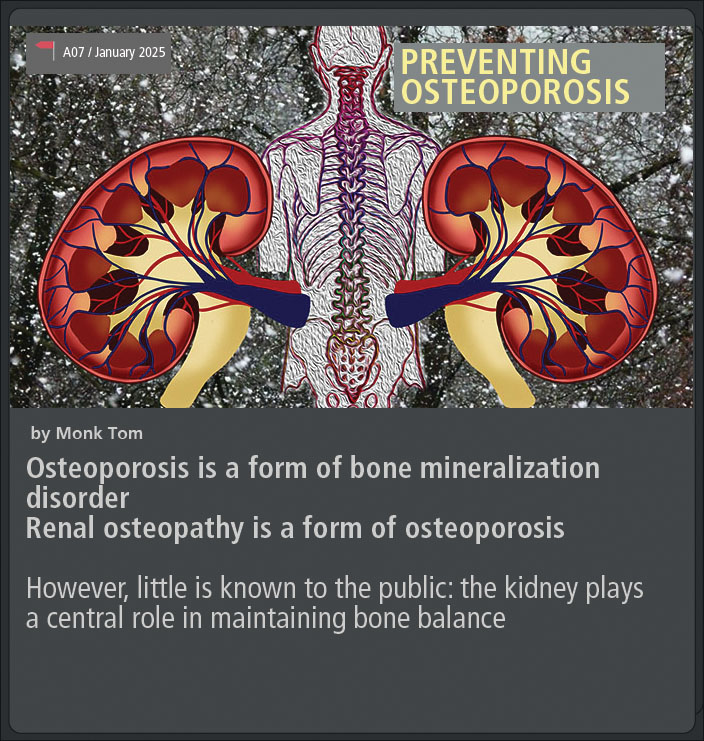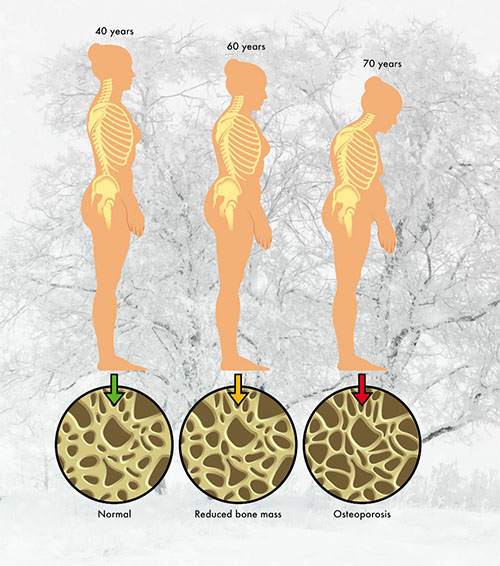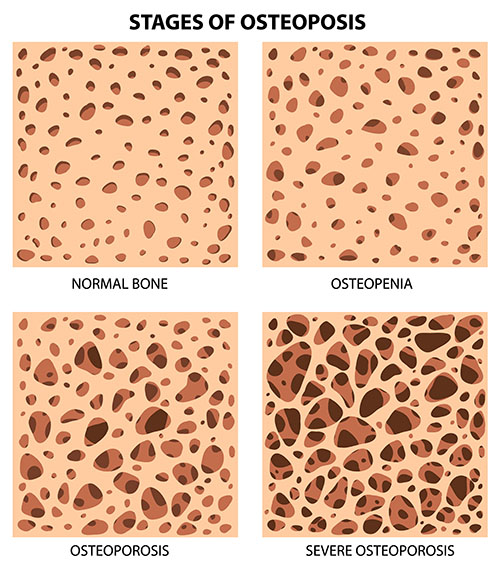PREVENTION IS BETTER THAN OSTEOPOROSIS


by Monk Tom
Renal insufficiency in Western countries is increasing.
The kidneys not only filter pollutants from the blood but also add nutrients that come directly from the small intestine or liver into the blood as needed. And the nutrients include calcium. Calcium is a mineral that the body needs to build and maintain strong bones and perform many important functions. Calcium is the most abundant mineral in the body. Almost all of the calcium in the body is stored in bones and teeth, giving them structure and hardness.

Kidneys regulate bone balance
However, little is known to the public: The kidney plays a central role in maintaining bone balance, as vitamin D is converted into the active form in the kidney into the hormone “calcitriol”. And this hormone Calctriol helps calcium absorption from the nutrients and mineralizes the bones and teeth with calcium. If the kidneys are overwhelmed as a result of poor diet and alcohol or through emotions such as fears, renal insufficiency (underfunction of one or both kidneys or even kidney failure) can occur. This results in a calcitriol deficiency. This means that the calcium in the blood cannot mineralize the bones with calcium without the hormone calcitriol and this results in a mineralization disorder of the bones - medically called renal osteopathy.

Osteoporosis stages
But how is this connected: sick kidneys and weak bones?
“The kidneys are not only an excretory organ, but also a metabolic organ,” says Prof. Dr. med. Markus Ketteler, chief physician for general internal medicine and nephrology/geriatrics at the Robert Bosch Hospital/Stuttgart and chairman of the commission of the German Society for Nephrology (DGfN). "If kidney function is severely impaired, for example, vitamin D metabolism is impaired, which hinders the absorption of calcium into the body and the incorporation of calcium into the bones." If this mineralization disorder is not stopped, the risk of bone fractures increases, bone softening, bone loss and muscle weakness are also possible consequences. In advanced kidney failure, calcium deposits can also form in the arteries in addition to calcium deposits in the joints. That's why those affected have a high risk of developing arteriosclerosis (hardening of the arteries) and the risk of a heart attack or stroke increases rapidly.
However, the drug calcitriol that doctors use to treat this has very extreme side effects. Calcitriol is a medication used to treat low calcium levels caused by kidney disease. It can also treat parathyroid disorders. Calcitriol increases the amount of calcium (vitamin D) in the body and helps regulate parathyroid levels. The brand name of this medication is Rocaltrol®.
Side effects are:
Dry mouth
Headache
Loss of appetite
Metallic taste in the mouth
Upset stomach
Allergic reactions - rash, itching, hives, swelling of the face, lips, tongue or throat Changes in heart rhythm – fast or irregular heartbeat
Dizziness
Weakness or feeling light-headed chest pain,
Difficulty breathing
High calcium levels increased thirst or increased amount of urine Nausea-vomiting
Confusion unusual weakness or tiredness Bone pain
High phosphorus levels
Muscle pain or cramps
Bone or joint pain
Numbness and tingling in the mouth area
Unfortunately, there is no medical information as to how damaging this medication is to human organs.
Tip from Monk Tom
To prevent osteoporosis, it is very important to have healthy kidneys. And especially in winter it is important to take good care of your kidneys and take good care of your kidneys. The kidneys are very sensitive to cold and need lots of warm, unsweetened drinks. You should start drinking turmeric tea daily. Because turmeric with lemon helps cleanse the kidneys and prevents getting kidney stones. You should also pay close attention to your diet, little meat, no sausage products, but a fatty herring every day and lots of hot vegetables and hot fruits soaked in hot water (fruit tea). Forget using the frying pan to fry, just boil everything in water. Soups are ideal and healthy food for this.
Rule of thumb:
Cook only with water and not with oil. Anything cooked, baked or fried above 100°C is unhealthy.
